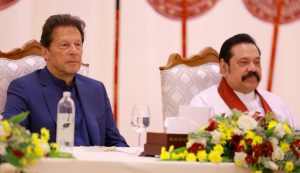On February 23, Pakistan’s Prime Minister Imran Khan arrived in Sri Lanka on a two-day visit at the request of the country’s prime minister, Mahinda Rajapaksa.
Traditionally, Pakistan and Sri Lanka have had a somewhat cordial relationship. Accordingly, Khan was welcomed with much fanfare in Sri Lanka. On his arrival, he was received by his Sri Lankan counterpart and presented a guard of honor. Rajapaksa has been constantly tweeting about Khan’s visit and even shared messages in Urdu, Pakistan’s national language.
Beyond the ceremonial warm welcome, however, the visit has not offered much that Islamabad could describe as a foreign policy win. In fact, any such efforts on Pakistan’s part were quietly snubbed by Sri Lanka.
Last week, Khan’s planned address to Sri Lanka’s parliament was abruptly cancelled. This is not something that can, or should be, ignored if one is to talk about the strategic significance of the relationship. While Sri Lanka’s government cited scheduling issues and COVID-19 concerns in cancelling the address, many believe that may not have been the real reason.
Reportedly, the decision was taken over concerns that Khan might use the opportunity to talk about Pakistan’s bilateral disputes with India, particularly the Kashmir situation and New Delhi’s alleged expansionist regional policy. Some Sri Lankan government sources were worried that Khan’s address may sour already strained ties with India after the cancellation of a major port deal.
“Clearly there was some consideration of him either bringing up Muslim rights or indeed the issue of Kashmir,” Paikiasothy Saravanamuttu, executive director at the Colombo-based Centre for Policy Alternatives, told Al Jazeera. “So to avoid ruffling Indian sensitivities and those of the majority [Sri Lankan] community who are behind the cremation/burial issue, it was decided that it would not happen.”
Sri Lanka remains embroiled in religious tensions whereby the country’s Muslims population – who make up 10 percent of the population — has suffered at the hands of Buddhist nationalists. Muslims in Sri Lanka are being increasingly persecuted since the current government came to power in 2019. Over the last year, Sri Lanka has carried out forced cremation of coronavirus victims, a practice prohibited by Islam. Ahead of Khan’s visit Sri Lanka’s government announced that it would stop the forced cremation of people dying from COVID-19, a move merely meant to appease Islamabad. While the announcement was lauded by Khan, Human Rights Watch said that forced cremations were ongoing despite government’s assurances.
Essentially,Sri Lanka offered Khan something to tweet about as he is known for pushing back on Islamophobia internationally. However, at the same time Sri Lanka virtually took away all other avenues where Khan could have discussed the matter. Citing security reasons, Sri Lanka’s government even rejected a request by 15 Muslim parliamentarians to meet Khan.
Experts have warned that Islamabad should not consider Khan’s visit anything more than a bilateral trip. “Pakistan and Sri Lanka have very historic and good relations. We played a very pivotal role in their victory against Tamil insurgency. Now we should not put our friends in trouble by indulging in any other issue than bilateral relations,” former Foreign Secretary Riaz Khokhar told Arab News.
It is possible that Sri Lanka’s government conveyed to the Pakistani leadership that Khan, during his visit, should refrain from talking about the widely reported plight of Muslims in the country. Moreover, any briefings that Khan may have received before leaving for Sri Lanka must have highlighted Colombo’s sensitivities that Islamabad should respect in order for the bilateral relationship to stay the course. It is not a surprise that none of Khan’s statements or other official press releases touched on the subject, despite the hopes of Sri Lankan Muslims.
The only reference to any religious matter came from Rajapaksa. In a Twitter post, he said that Sri Lanka “is grateful to Pakistan for agreeing to open the pilgrimage corridors for Sri Lankans to visit ancient Buddhist heritage sites in Pakistan.” Stating Pakistan’s cooperation to tackle militancy, he also noted “We will continue to work together to fight terrorism, religious fundamentalism and extremism.”
It is important to note here that a forthcoming resolution at the United Nations Human Rights Council (UNHRC) is calling for investigation into worsening human rights conditions in Sri Lanka. U.N. rights chief Michelle Bachelet has asked for an International Criminal Court investigation into Sri Lanka’s military operations against Tamil separatists, which she believes amount to war crimes. The UNHRC is set to vote on the resolution in March.
Reportedly, Sri Lanka has sought India’s support at the UNHRC to thwart the resolution. Pakistan, which has always supported Sri Lanka at international forums, is expected to support Colombo’s case as well. Pakistan and India’s support at the UNHRC can help Sri Lanka in killing the resolution as both countries can assist in lobbying other nations at the forum.
Thus, Colombo has offered a visit marked with requisite pomp to Khan, but at the same made India happy by not allowing Islamabad to use the opportunity to voice anti-India concerns. Islamabad, on the other hand, is happy to ignore the issue of Muslims’ plight in Sri Lanka, just as the country has done in the case of Uyghur Muslims in China. In the end, the visit only highlighted strategic constraints in the bilateral relationship and Pakistan’s own foreign policy dilemmas, which will continue to remain for years to come.

































